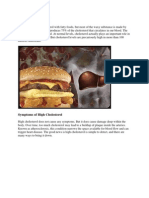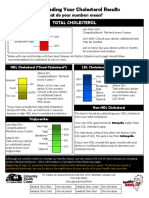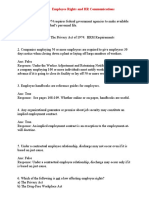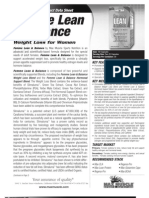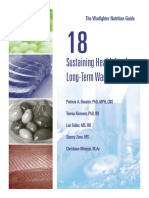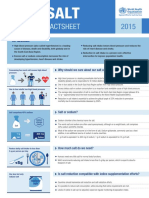Health Cholesterol
Health Cholesterol
Uploaded by
Saud PathiranaCopyright:
Available Formats
Health Cholesterol
Health Cholesterol
Uploaded by
Saud PathiranaCopyright
Available Formats
Share this document
Did you find this document useful?
Is this content inappropriate?
Copyright:
Available Formats
Health Cholesterol
Health Cholesterol
Uploaded by
Saud PathiranaCopyright:
Available Formats
Normalize your Cholesterol (Page 1 of 3)
Page 1 of 3
Index
Food Movies Music Travel Fashion Shopping Money Games
Home
Puzzles
Fitness
Illusions
Personality
Paranormal
Linguistics
Software
Health
Stop Smoking Cholesterol Hygiene CR Calculator Calorie Restriction Nutritional Data (Page 1 of 3) 1 |2 |3 | Next >
Normalize your Cholesterol
through diet and lifestyle changes
Cholesterol and Heart Disease Heart disease or cardiovascular disease (CVD) is the primary cause of death in the United States. Each year, more than one million Americans have heart attacks, and half a million die from heart disease. The chance of developing heart disease or having a heart attack increases as your level of blood cholesterol increases.
Staten Islands #1 Psychic
Tells Past Present And Future Guaranteed Love Spells And Readings
statenislandpsychic.com
100% Black Magic Remove
Cholesterol
Expert Indian Vedic Rituals Remove All Sort of Curses & Black Magic.
www.fortunevoice.com
Cholesterol is a fatty substance produced mainly by the liver and intestines. Cholesterol is a constituent of cell membranes, and it is used by the body to produce bile acids and steroid hormones such as testosterone, estradiol, progesterone, and cortisol. Exposure of the skin to direct sunlight converts cholesterol to vitamin D, which is necessary for bone development. Besides being produced by some organs, cholesterol can also originate from foods of animal origin such as meats, fish, and dairy. Cholesterol travels through the bloodstream in compounds called lipoproteins. Low-density lipoproteins (LDL or "bad" cholesterol) deliver cholesterol to the body, whereas high-density lipoproteins (HDL or "good" cholesterol) take cholesterol out of the bloodstream. Hyperlipidemia is an elevation of lipids in the bloodstream. These lipids include cholesterol, cholesterol esters, phospholipids, and triglycerides. Excess cholesterol builds up gradually in the walls of the arteries causing atherosclerosis or "hardening of the arteries". The cholesterol plaques narrow the arteries and decrease the blood flow that can reach the heart. Chest pain (angina pectoris) usually occurs during exertion when the heart muscle requires more blood oxygen than can be delivered by the narrowed coronary arteries. A heart attack occurs when a cholesterol plaque ruptures and mixes with blood to form a clot that completely blocks blood flow to the heart muscles. Your Cholesterol Numbers A blood test called a "lipoprotein profile" or "lipid panel" is used to determine your cholesterol numbers. This test is done after a 9- to 12-hour fast. The Total Cholesterol (TC) value is obtained using a formula called the Friedewald equation (named for William Friedewald, who developed it) by adding the LDL, the HDL, plus one fifth of the value of the triglycerides (TG), i.e., (TC = LDL + HDL + TG/5) when the values are in milligrams (mg) per deciliter (dl) of blood. The numbers in parentheses are in millimoles per liter. The following table summarizes the interpretation of the numbers. Total Cholesterol Less than 200 mg/dl (5.2 mmol/l) 200-239 mg/dl (5.2-6.2 mmol/l) 240 mg/dl (6.3 mmol/l) and above Less than 100 mg/dl (2.6 mmol/l) 100-129 mg/dl (2.6-3.3 mmol/l) 130-159 mg/dl (3.4-4.0 mmol/l) 160 mg/dl (4.1 mmol/l) and above Desirable Borderline high High Optimal Near optimal Borderline high High
LDL Cholesterol Level
HDL Cholesterol Levels
http://www.scientificpsychic.com/health/cholesterol.html
6/12/2011
Normalize your Cholesterol (Page 1 of 3)
Page 2 of 3
Less than 40 mg/dl (1.0 mmol/l) 40-59 mg/dl (1.0-1.5 mmol/l) 60 mg/dl (1.6 mmol/l) and above Less than 150 mg/dl (1.7 mmol/l) 150-199 mg/dl (1.7-2.2 mmol/l) 200 mg/dl (2.3 mmol/l) and above
Heart disease risk factor Normal range Lower risk of heart disease Normal Borderline high High
Triglycerides
What causes high cholesterol? High blood cholesterol is generally caused by bad diet, but 1 in every 500 cases may be due to genetic causes (familial hypercholesterolemia). Eating foods that are high in saturated fats and hydrogenated oils cause the liver to produce more LDL cholesterol that increases your cholesterol numbers. If the foods that you eat are also high in cholesterol, and if you don't have sources of soluble fiber, phytosterols, and polyunsaturated fats in your diet, you end up with high blood cholesterol. The cholesterol problem can get worse and your risk of cardiovascular disease increases if you are overweight, don't exercise, or you smoke. There is a pill for that. The general public, as well as doctors, are inundated with advertisements from pharmaceutical companies promoting cholesterol-lowering drugs. Once a blood test shows a high level of cholesterol, a doctor will usually not hesitate to prescribe one of the following drugs (trade names in parentheses): lovastatin (Mevacor), simvastatin (Zocor, Lipex, Simvar, Vytorin), pravastatin (Pravachol), atorvastatin (Lipitor), fluvastatin (Lescol, Vastin), and rosuvastatin (Crestor). The prevailing philosopy seems to be that people do not have enough self-restraint to change their life style. It is much easier for them to take one pill every day in spite of the possible adverse effects of the drugs. Unfortunately, people are seldom offered information about how they can help themselves without resorting to using drugs for the rest of their life. How can you lower your cholesterol with lifestyle changes? The National Cholesterol Education Program established by National Heart, Lung, and Blood Institute of the NIH says that reducing the amount of saturated fat and cholesterol in your diet helps lower your blood cholesterol level. The program advocates Therapeutic Lifestyle Changes (TLC) which consist of: Diet. A cholesterol-reducing diet should contain less than 7% of calories from saturated fat and less than 200 mg of dietary cholesterol per day. The diet recommends only enough calories to maintain a desirable weight and avoid weight gain. In addition, the amount of soluble fiber should be increased, and food products containing plant stanols or plant sterols should be included in the diet. Weight Management. Losing weight can help to lower LDL and is specially important for people with a large waist circumference, i.e., men with a waist of more than 40 inches (101 cm), and women with a waist of more than 35 inches (89 cm). Physical Activity. Thirty minutes of daily exercise is recommended for everyone because it can help raise HDL and lower LDL. A competent dietician or a metabolism expert can probably deduce why these recommendations can lower cholesterol. However, the information contained in these guidelines is not enough to enable the average person to get a scientific foundation for guiding their nutritional and lifestyle choices.Weight management and physical activity are discussed in different sections. The following paragraphs describe the scientific basis for the dietary recommendations in simple terms.
CONTINUED: Balancing Dietary Fat 1 |2 |3 | Next >
Fats That Heal, Fats That Kill Udo Erasmus Best Price $1.03 or Buy New $15.61
Privacy Information
Copyright 2006 - Antonio Zamora
Search for topics related to cholesterol: Search
Custom Search
The results from searching "lower cholesterol diet" may provide alternative suggestions: Low Cholesterol Diet - a diet to lower cholesterol naturally Low Cholesterol Diet and Nutrition for Heart Disease: diet tips to lower cholesterol naturally. Topics include low cholesterol diet solutions, natural foods ... www.healthcastle.com/low-cholesterol-diet High Cholesterol Diet and Nutrition for Heart Disease
http://www.scientificpsychic.com/health/cholesterol.html
6/12/2011
Normalize your Cholesterol (Page 1 of 3)
Page 3 of 3
Topics include high cholesterol diet solutions, natural foods and supplements lower blood pressure and high cholesterol and other heart disease conditions. www.healthcastle.com/high-cholesterol-diet NHLBI-CHD How to Lower Your Cholesterol Level Here are steps you can take to lower your blood cholesterol or keep it low:. Follow a low saturated fat, low-cholesterol diet. Be more physically active. ... www.nhlbisupport.com/chd1/how.htm Cholesterol: The best foods to lower your cholesterol and protect ... A cholesterol-lowering diet in which 20 percent of the calories come from ... Though it may not lower your cholesterol, soy does contain vitamins and ... www.mayoclinic.com/health/cholesterol/ Cholesterol and Diet Information You can lower your cholesterol level by switching to a lower-fat diet thus reducing intake of animal fat and other fats and eating foods rich in starch and ... www.annecollins.com/cholesterol-diet.htm Cholesterol Diet Plan Exercise goes hand-in-hand with healthy diet. Physical exercise can raise HDL cholesterol and may lower LDL cholesterol. Being more active can also help you ... www.annecollins.com/cholesterol-diet-plan.htm High Cholesterol - Cholesterol Diet - Lower Cholesterol Here's the latest scientific thinking about high cholesterol, learn how to lower cholesterol with medication and a good low cholesterol diet. www.health.harvard.edu/special_health_reports/What_to_do_About_High_Cholesterol.htm How Can I Lower My Cholesterol By Changing My Diet? - Lowering ... Making changes in your diet and adding certain vitamins and nutritional supplements can help to lower your cholesterol. nutrition.about.com/od/dietsformedicaldisorders/f/lowercholestero.htm Low Cholesterol Diet Q & A Q My GP has told me I have a high cholesterol level. Before putting me on drugs, he wants to see if losing weight and changing my diet will help lower it. ... www.weightlossresources.co.uk/diet/low_fat/low_cholesterol.htm Low Cholesterol Diet a high blood cholesterol, even after following a Step-1 diet for 6 to 12 ... Research indicates that soluble fiber helps to lower blood cholesterol levels. ... www.gicare.com/pated/edtot24.htm When searching, avoid common misspellings of cholesterol: colesterol cholesteral cholesterole cholestorol chloesterol cholestrol kolesterol cholesteroll kholesterol cholestero cholesterl xolesterol cholesteol cholestrol choleserol choleterol cholsterol choesterol chlesterol holesterol
http://www.scientificpsychic.com/health/cholesterol.html
6/12/2011
You might also like
- The Obesity Fix - James DiNicolantonioDocument811 pagesThe Obesity Fix - James DiNicolantoniokirin93% (15)
- BIO-319 3 Day Diet Analysis WorksheetDocument12 pagesBIO-319 3 Day Diet Analysis WorksheetArooba ShafiqueNo ratings yet
- NFPA Codes - and - StandardsDocument1 pageNFPA Codes - and - StandardsSaud PathiranaNo ratings yet
- BS 7533 Part 7Document44 pagesBS 7533 Part 7Saud Pathirana100% (1)
- Oxo AQAGCSE B7 ws01 XxaannDocument2 pagesOxo AQAGCSE B7 ws01 XxaannParam BhimaniNo ratings yet
- Eating PlanDocument3 pagesEating PlanDavid Caruana100% (1)
- Phase 3: Pre-Maintenance - Acceptable Foods ListDocument1 pagePhase 3: Pre-Maintenance - Acceptable Foods ListNadim527No ratings yet
- Administrative RequirementsDocument5 pagesAdministrative RequirementsSaud PathiranaNo ratings yet
- What Is Cholesterol?Document21 pagesWhat Is Cholesterol?cutegal88No ratings yet
- Understanding Cholesterol ResultsDocument3 pagesUnderstanding Cholesterol Resultsashoku2100% (2)
- Reduce CholestrolDocument26 pagesReduce CholestrolAnand FreelanceNo ratings yet
- The Vitamin Solution by Dr. Romy Block & Dr. Arielle LevitanDocument9 pagesThe Vitamin Solution by Dr. Romy Block & Dr. Arielle LevitansimasNo ratings yet
- Label TextDocument1 pageLabel TextAXELofficialNo ratings yet
- Cholestrol - A Silent KillerDocument11 pagesCholestrol - A Silent KillerBhargavi RamachandranNo ratings yet
- Lose Fat: Eat Smaller DinnersDocument7 pagesLose Fat: Eat Smaller DinnersNeil BanerjeeNo ratings yet
- Ch04 Employee Rights and HR CommunicationsDocument5 pagesCh04 Employee Rights and HR CommunicationsJuliet BhandariNo ratings yet
- Treating High CholestrolDocument12 pagesTreating High Cholestrolvasanthi marimuthuNo ratings yet
- Nutri-Lean Booklet PDFDocument40 pagesNutri-Lean Booklet PDFAmol DeshmukhNo ratings yet
- Protein Options & Shopping ListDocument1 pageProtein Options & Shopping ListTrent J ACEONo ratings yet
- Commercial Weight Loss ProgramsDocument13 pagesCommercial Weight Loss ProgramsJenny Rivera100% (1)
- Foods That Help You Lose WeightDocument8 pagesFoods That Help You Lose WeightNella Diane Ismael BiabanNo ratings yet
- FEMME LEAN & BALANCE Product Data SheetDocument2 pagesFEMME LEAN & BALANCE Product Data SheetMax Muscle San Mateo, CA & San Francisco (Castro), CANo ratings yet
- Sustaining Health For The Long-Term WarfighterDocument15 pagesSustaining Health For The Long-Term WarfighterBenNo ratings yet
- Nutrition PlanDocument8 pagesNutrition PlanAlina CostinaNo ratings yet
- How To Maximize Your Health in The 21st CenturyDocument41 pagesHow To Maximize Your Health in The 21st CenturyabdullahalgarniNo ratings yet
- Fhe 7 8 14Document100 pagesFhe 7 8 14doina2101100% (1)
- Home Remedies For Gray HairDocument3 pagesHome Remedies For Gray Hairjerusalem nigussieNo ratings yet
- Get Ready To Bulk: A Complete Guide by Kashif RehmanDocument5 pagesGet Ready To Bulk: A Complete Guide by Kashif RehmanKashif RehmanNo ratings yet
- Autophagy: What You Need To KnowDocument7 pagesAutophagy: What You Need To Knowtuto aprikaNo ratings yet
- Aerobics - The Big Fat LieDocument28 pagesAerobics - The Big Fat Liealekad65No ratings yet
- Army Weight Management GuideDocument31 pagesArmy Weight Management GuideoakalleyNo ratings yet
- Ayurveda's Six Tastes & Their Effects On The Doshas - Amrita Veda PDFDocument4 pagesAyurveda's Six Tastes & Their Effects On The Doshas - Amrita Veda PDFVenkatesan KalaivananNo ratings yet
- Dr. Blyden: ObesityDocument65 pagesDr. Blyden: ObesityBlyden NoahNo ratings yet
- Anaysis Part 4 5Document2 pagesAnaysis Part 4 5api-435315347No ratings yet
- How To Eat To Get A Six Pack AbsDocument2 pagesHow To Eat To Get A Six Pack AbsRoda Gayle RañadaNo ratings yet
- Food For: Combining Chart Gompiete Efficient DigestionDocument1 pageFood For: Combining Chart Gompiete Efficient DigestionReju AngelusNo ratings yet
- Snacks That MEET The Recommended Criteria of The Nixa SchoolDocument10 pagesSnacks That MEET The Recommended Criteria of The Nixa Schoolbrookehaygood100% (1)
- Nutrition For The AthleteDocument11 pagesNutrition For The AthletewenghuatNo ratings yet
- Somatotype Regimens PDFDocument3 pagesSomatotype Regimens PDFXuxah Vera Fe dela ToreNo ratings yet
- FAT-KILLER-SHOTGUN-POWERFUL BULLETS For WEIGHT LOSSDocument19 pagesFAT-KILLER-SHOTGUN-POWERFUL BULLETS For WEIGHT LOSSaksingh000100% (2)
- How We Gain Fat - How To Lose ItDocument13 pagesHow We Gain Fat - How To Lose ItDany91roNo ratings yet
- Ifct2017 Github Io/readDocument5 pagesIfct2017 Github Io/readSubhajit Sahu100% (1)
- Andrew Gym Power Fat Blasting ProgramDocument34 pagesAndrew Gym Power Fat Blasting ProgramAndrew EscagedaNo ratings yet
- How To Implement Diet Breaks To Get Shredded LeanDocument11 pagesHow To Implement Diet Breaks To Get Shredded LeanHbsodndkNo ratings yet
- CholestrolDocument6 pagesCholestrolprince_woondNo ratings yet
- That Guy Who Ate All The Potatoes CookbookDocument52 pagesThat Guy Who Ate All The Potatoes CookbookAstrid SabirinNo ratings yet
- Obesity Gossips and Hiccoughs: Ranjini Datta Hod, Clinical Dietetics KPC Medical College & HospitalDocument43 pagesObesity Gossips and Hiccoughs: Ranjini Datta Hod, Clinical Dietetics KPC Medical College & HospitalRanjini DattaNo ratings yet
- Fat Metabolism During ExerciseDocument8 pagesFat Metabolism During ExercisealmaformaNo ratings yet
- Diet & Wellness Plus A Landry McReeDocument9 pagesDiet & Wellness Plus A Landry McReeLandry McReeNo ratings yet
- EAT-FAT GET-FIT Essentials: Low Carb Wellness Made Easy - Learn To Thrive Rather Than Merely Survive in Less Than 60 MinutesDocument50 pagesEAT-FAT GET-FIT Essentials: Low Carb Wellness Made Easy - Learn To Thrive Rather Than Merely Survive in Less Than 60 MinutesTed Neckowicz100% (1)
- Usana: Health ProductsDocument30 pagesUsana: Health ProductsAdrian Gamboa MarcellanaNo ratings yet
- Types of Fat: Can Fat Be Good For You?Document13 pagesTypes of Fat: Can Fat Be Good For You?Περικλής ΣχιζοειδήςNo ratings yet
- Iodine: An Essential MineralDocument14 pagesIodine: An Essential Mineralrob mitchellNo ratings yet
- Factsheet: Why Should We Care About Our Salt Consumption?Document2 pagesFactsheet: Why Should We Care About Our Salt Consumption?Avtek Ketek100% (1)
- 100 Days of Weight Loss MaterialsDocument3 pages100 Days of Weight Loss MaterialsCeleste AbdonNo ratings yet
- How To Watch CaloriesDocument2 pagesHow To Watch CaloriesCharmaine AlipayoNo ratings yet
- Diet Plann!Document3 pagesDiet Plann!Rahila Saeed100% (1)
- Weight Loss & YouDocument10 pagesWeight Loss & YouAmmarNo ratings yet
- Wellness Warrior Starter KIT: Live WellDocument24 pagesWellness Warrior Starter KIT: Live WellBetty100% (1)
- Oxidized LDL (Blog Post)Document10 pagesOxidized LDL (Blog Post)simasNo ratings yet
- Very-Low-Calorie Diets With High and Low Protein Content: Impact On Triiodothyronine, Energy Expenditure, and Nitrogen Balance1Document9 pagesVery-Low-Calorie Diets With High and Low Protein Content: Impact On Triiodothyronine, Energy Expenditure, and Nitrogen Balance1acolpoNo ratings yet
- Ghee Fat Bombs: Why These Are Unique & They Aid in Lose Weight?Document5 pagesGhee Fat Bombs: Why These Are Unique & They Aid in Lose Weight?Pallabi GoswamiNo ratings yet
- Diet and Fitness Explained (2 Books in 1): HCG Diet Cookbook and TLC Cookbook + Muscle Physiology: Building Muscle, Staying Lean, Bodybuilding Diet and Transform Your Body ForeverFrom EverandDiet and Fitness Explained (2 Books in 1): HCG Diet Cookbook and TLC Cookbook + Muscle Physiology: Building Muscle, Staying Lean, Bodybuilding Diet and Transform Your Body ForeverNo ratings yet
- Man Overboard StoryDocument9 pagesMan Overboard StorySaud PathiranaNo ratings yet
- Product Shedule:Gold Glass Mosaic (Real Gold) - : EIDOS GLASS S.R.LDocument1 pageProduct Shedule:Gold Glass Mosaic (Real Gold) - : EIDOS GLASS S.R.LSaud PathiranaNo ratings yet
- Cerasmic 1sparkleDocument1 pageCerasmic 1sparkleSaud PathiranaNo ratings yet
- Gold Coated Mosaic TilesDocument2 pagesGold Coated Mosaic TilesSaud PathiranaNo ratings yet
- BASF PCI Carragrout DSDocument4 pagesBASF PCI Carragrout DSSaud PathiranaNo ratings yet
- StonesDocument9 pagesStonesSaud PathiranaNo ratings yet
- BASF Mastertop 538 DSDocument3 pagesBASF Mastertop 538 DSSaud PathiranaNo ratings yet
- Adesilex P10 - Leed Product Information: DateDocument1 pageAdesilex P10 - Leed Product Information: DateSaud PathiranaNo ratings yet
- In-Situ Density Determination by Sand Replacement MethodDocument11 pagesIn-Situ Density Determination by Sand Replacement MethodkillerhAPPyNo ratings yet
- Nuclear Density Test - Earthworks - Chapter - 12Document16 pagesNuclear Density Test - Earthworks - Chapter - 12Saud PathiranaNo ratings yet
- Adesilex P10 - TDSDocument4 pagesAdesilex P10 - TDSSaud PathiranaNo ratings yet
- Cast StonesDocument8 pagesCast StoneslokuputaNo ratings yet
- Execution and Closeout RequirementsDocument7 pagesExecution and Closeout RequirementsSaud PathiranaNo ratings yet
- Temporary Facilities and ControlsDocument4 pagesTemporary Facilities and ControlsSaud PathiranaNo ratings yet
- T T T T Traffic S Raffic S Raffic S Raffic S Raffic Signal Ignal Ignal Ignal Ignal S Ss Sstandar Tandar Tandar Tandar Tandards Ds Ds Ds DsDocument8 pagesT T T T Traffic S Raffic S Raffic S Raffic S Raffic Signal Ignal Ignal Ignal Ignal S Ss Sstandar Tandar Tandar Tandar Tandards Ds Ds Ds DsSaud PathiranaNo ratings yet
- Submittal ProcedureDocument9 pagesSubmittal ProcedureSaud PathiranaNo ratings yet
- Facility Services CoordinationDocument1 pageFacility Services CoordinationSaud PathiranaNo ratings yet
- CONCRETE TECHNOLOGY - FabricationDocument12 pagesCONCRETE TECHNOLOGY - FabricationSaud PathiranaNo ratings yet
- Driplines General DataDocument1 pageDriplines General DataSaud PathiranaNo ratings yet
- PRFD - Materials Database List (Section - C) : Parks and Recreation Facilities Division (PRFD)Document1 pagePRFD - Materials Database List (Section - C) : Parks and Recreation Facilities Division (PRFD)Saud PathiranaNo ratings yet
- Product ManualDocument3 pagesProduct ManualSaud PathiranaNo ratings yet
- Maximum Recommended Lengths: PC 16 MM - 1 LPH Nominal FlowDocument5 pagesMaximum Recommended Lengths: PC 16 MM - 1 LPH Nominal FlowSaud PathiranaNo ratings yet
- Drippers Technical Specifications: PC 16 MMDocument2 pagesDrippers Technical Specifications: PC 16 MMSaud PathiranaNo ratings yet
- Head Losses (Bar) V/s Lengths (Meters) : PC 16 MM - 2 LPH Nominal FlowDocument4 pagesHead Losses (Bar) V/s Lengths (Meters) : PC 16 MM - 2 LPH Nominal FlowSaud PathiranaNo ratings yet
- Nutrition and Renal DiseaseDocument6 pagesNutrition and Renal DiseasefranzcatchieNo ratings yet
- WHO CINDI Macedonian Action Plan, 2002-2007.Document22 pagesWHO CINDI Macedonian Action Plan, 2002-2007.Ass. Prof. Vera Simovska, MD., PhD.100% (11)
- Preoperative Evaluation Before Noncardiac Surgery.Document16 pagesPreoperative Evaluation Before Noncardiac Surgery.Paloma AcostaNo ratings yet
- Amazing Health Benefits of Guava Leaves in Daily Routine - MyHeaDocument19 pagesAmazing Health Benefits of Guava Leaves in Daily Routine - MyHeaACHARA PETERSNo ratings yet
- 196 ArticleText 1084 1 10 20210213Document11 pages196 ArticleText 1084 1 10 20210213emaryannparrillaNo ratings yet
- Y8 ScienceDocument10 pagesY8 SciencesfpywpsqhsNo ratings yet
- Grand Case PresentationDocument50 pagesGrand Case PresentationJean Michelle100% (1)
- Gallstone Disease and The Risk of Cardiovascular Disease: A Systematic Review and Meta-Analysis of Observational StudiesDocument7 pagesGallstone Disease and The Risk of Cardiovascular Disease: A Systematic Review and Meta-Analysis of Observational StudiesAfkar30No ratings yet
- Artículo Dislipemia ESCDocument12 pagesArtículo Dislipemia ESCSMIBA MedicinaNo ratings yet
- Legalization of Marijuana in IndiaDocument40 pagesLegalization of Marijuana in IndiaSiddharth Garg100% (1)
- Hot Weather and Heat Extremes Health Risks Lancet 2021Document11 pagesHot Weather and Heat Extremes Health Risks Lancet 2021Yovita LimiawanNo ratings yet
- Ymca Blood Pressure Self Monitoring Lowering Cardiovascular Disease Risk in Ann Arbor MiDocument2 pagesYmca Blood Pressure Self Monitoring Lowering Cardiovascular Disease Risk in Ann Arbor Miapi-710211553No ratings yet
- Mapping The Health System Response To Childhood Obesity in The WHO European Region. An Overview and Country Perspectives (2019) PDFDocument98 pagesMapping The Health System Response To Childhood Obesity in The WHO European Region. An Overview and Country Perspectives (2019) PDFDuren Turangan100% (1)
- Saffola Cooking Oil Group F Sec EDocument9 pagesSaffola Cooking Oil Group F Sec EShiba Prasad MajhiNo ratings yet
- Cardiovascular-Kidney-Metabolic (CKM) Syndrome. A State-Of-The-Art Review (2024)Document10 pagesCardiovascular-Kidney-Metabolic (CKM) Syndrome. A State-Of-The-Art Review (2024)ericdgNo ratings yet
- Gimbi FeasiblityDocument68 pagesGimbi FeasiblityEyob Adamu100% (1)
- Cardiac RehabilitationDocument15 pagesCardiac RehabilitationAshraf MullaNo ratings yet
- APPI Guide To Health and Nutrition 2nd EditionDocument188 pagesAPPI Guide To Health and Nutrition 2nd Editionshivshekar100% (1)
- Drinking Mineral Waters Biochemical Effects and HeDocument18 pagesDrinking Mineral Waters Biochemical Effects and HeАлена КисилевскаяNo ratings yet
- Thesis Statement For Nicotine AddictionDocument8 pagesThesis Statement For Nicotine Addictiongbww46x7100% (2)
- Mapeh Q2 WK4Document8 pagesMapeh Q2 WK4karla callejaNo ratings yet
- NCP 1Document2 pagesNCP 1Momshie SyNo ratings yet
- Nutricao Biesalski, H. K., & Tinz, J. (2017) - Multivitaminmineral Supplements Rationale and Safety. NutritionDocument35 pagesNutricao Biesalski, H. K., & Tinz, J. (2017) - Multivitaminmineral Supplements Rationale and Safety. NutritionSurama SilvaNo ratings yet
- Hot Topics 4e MRCGPDocument13 pagesHot Topics 4e MRCGPgautambob29% (7)
- Guidelines For The Primary Prevention of Stroke: AHA/ASA GuidelineDocument79 pagesGuidelines For The Primary Prevention of Stroke: AHA/ASA Guidelinemeggin cabotNo ratings yet
- Absolute Cardiovascular Risk Assessment: DiseaseDocument6 pagesAbsolute Cardiovascular Risk Assessment: DiseaseCharlene GrajeraNo ratings yet
- Dimension of Development:: Health AwarenessDocument28 pagesDimension of Development:: Health AwarenessMelNo ratings yet
- Journal of Food Biochemistry - 2022 - Rana - Health Benefits of Polyphenols A Concise ReviewDocument24 pagesJournal of Food Biochemistry - 2022 - Rana - Health Benefits of Polyphenols A Concise ReviewGustavoTorresNo ratings yet








